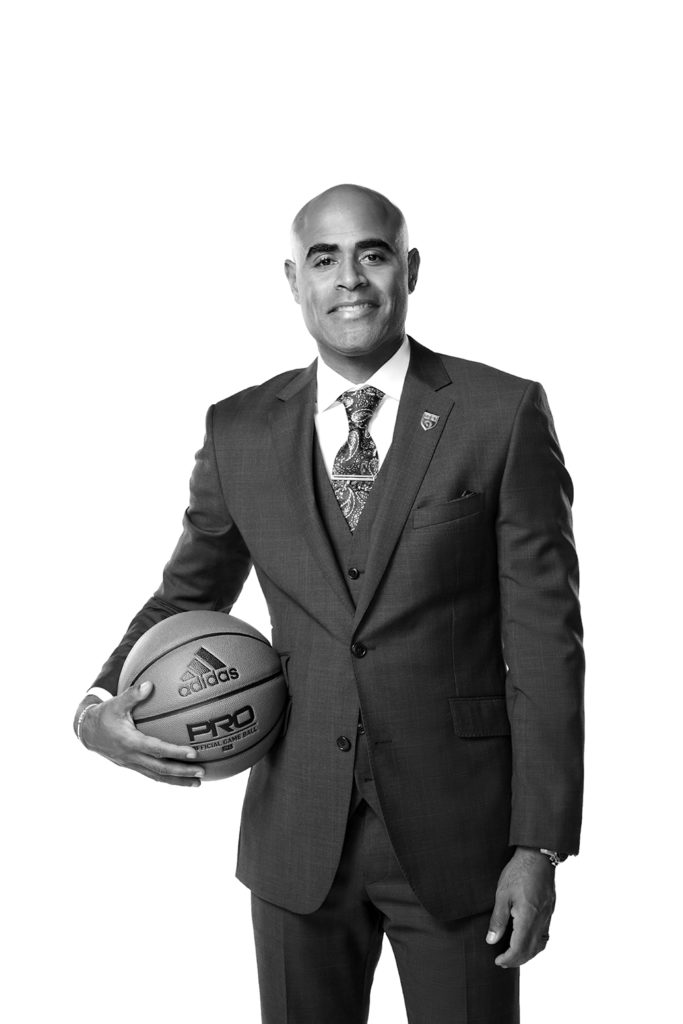Stan Johnson is the head coach of the LMU men’s basketball program. Hired in March 2020, Johnson led the LMU program to a third-place WCC finish in the 2020–21 pandemic-shortened season. Johnson was on the coaching staff of Marquette University for five seasons before coming to LMU. He has spoken often about his desire to “raise the standard” of LMU basketball. We talked to him about his view that culture is crucial to building a successful athletic program. He was interviewed by Editor Joseph Wakelee-Lynch.
When you talk about a basketball program’s culture, you seem to describe it as a necessary component of success. What is culture and how is it different from a team’s cohesion or togetherness?
A culture is the way we all want to behave. It’s a set of behaviors and values. If we have the right culture, we are going to work hard. If we have the right culture, we’re going to approach practice the right way. If we have the right culture, we’re going to approach academics the right way. If we have the right culture, we’ll have the right relationships. Behavior, attitude, how we act correlate with what’s going to happen between the lines. So, if we don’t have the right culture and our guys don’t understand what we stand for, then we don’t know what we’re playing for.

Does an athletic program’s culture evolve naturally?
Every program has a culture: It’s either by design or left to chance. I’ve seen teams unravel because the core of a team, the culture, wasn’t strong enough to handle any adversity. What I’m trying to do is create something by design and be intentional about it.
Do you think John Wooden, at UCLA,and John Thompson, at Georgetown, were coaches who built a unique culture for their programs, and not just great teams?
Coach Wooden’s Pyramid of Success was his culture. When you went to UCLA, one of the first things you learned was how to tie your shoes and put your socks on — how you do the little things will determine how you do the big things. With Coach Thompson, the same is true, especially from an academic standpoint and in terms of his discipline. But, also, he fought for his players. He was a father figure. There were so many things he did to establish culture.
How can you tell that a player has bought in and owned a team culture himself? What does that look like?
He starts to fight for the culture. He starts to hold his teammates accountable to the things we believe in. He also begins to speak our language. Once a player understands it and begins to fight for it, then I know that that guy has bought in. That’s what I want: a culture that’s player-led.
Do you think the results of building an intangible culture are visible?
People are seeing change. They’re seeing the GPA go up — best GPA in the history of the program. They’re seeing players be in the best shape physically. I think people are starting to see what we’re about, and they’re deciding that that’s authentic.
Is there anything unique about LMU that you think makes the culture you’re building in the men’s basketball program unique?
I believe the things that are required for winning are transferable anywhere. But there are things here that are specific to LMU. This year, our motto is “Raise the Standard.” We have a strategic asset [in our basketball program.]. We must use that asset and pour into that asset. That asset is not the most important thing here at the university. It never will be. The university’s academics are No. 1. But what this asset can do is drive enrollment, help the business school, help the science school. When this asset is used correctly, you cannot not pay for the level of exposure that men’s basketball can bring to a university. Another theme for our year is haijakamalika, which in Swahili means incomplete. We’re always chasing this thing called being complete. How can we close the gap to becoming more complete? I think men’s basketball is the fastest vehicle to do so. So, in that regard, that part of my message is completely LMU: We are sitting on a gold mine. But we have to raise the standard, we have to become more complete. This program can help this university.
